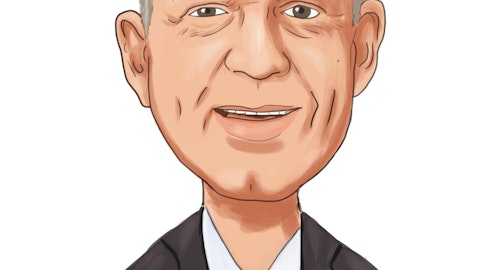John Ciampaglia : Yes, it’s a great question. I mean I think a lot of Western asset managers have dreamed about somehow penetrating the Japanese market over the last 20, 30 years, given 0 interest rates have been in existence there forever. I think the reality is it’s very hard to penetrate into some of these markets because of home country bias and almost near kind of oligopoly strength of financial institutions, which are very concentrated. So I think the answer for us is very similar. It’s been — we’ve not had a lot of engagement from that particular market, in a category, you would think they would be buying in droves given the alternatives are not that compelling. But as we’ve experienced with some of our other funds, when a category does come into favor and when a marketplace is interested, we’ve done a very good job in terms of capturing global flows from a number of different institutional investors.
I think the Uranium Trust is probably the best case study in terms of having a differentiated product that is very transparent in the way it operates and being able to scale and provide liquidity to institutions is quite valuable. So we would love to engage with different parts of the globe, but Japan is 1 that we have not yet really had much traction with.
Operator: Our next question which comes from the line of Rasib Bhanji of TD Securities.
Rasib Bhanji : If I could go back to the Uranium Trust, the redemption feature that you’re considering introducing. So I think almost a year ago when the Uranium Trust was trying to get a listing on the New York Stock Exchange. I guess the biggest factor of that not going through was the Uranium Trust not having a redemption feature. So if the redemption feature does come into play down the road, is that still on the plate and are you trying to get a listing on the New York Stock Exchange?
John Ciampaglia: Sure. Great question. In April of 2022, the SEC denied our application to list — to cross-list the trust. And it was really on the back of 2 reasons. One, all commodity stockpiling funds there require a monthly — excuse me, a redemption feature of some sort. And second of all, a real-time spot market price for the underlying commodity. In the uranium market, we would love to have a real-time spot market price, but it’s just not there in terms of 1 that I think you can depend on. I think our involvement in the market and the amount of buying activity and our voluntary reporting of all of that to the marketplace has helped enormously in terms of price discovery and transparency. But having said that, what we’re focused on right now as a discount management tool with the OSC is a limited redemption option.
We’re not sure that, that limited redemption option would be — would meet the standard listing requirements of the SEC. So at this time, what we’re trying to focus on is implementing the redemption option in Canada with our local regulator. And I’m going to emphasize a few things. It’s limited in size, meaning the percentage of the fund that would be eligible for annual redemption, it would be limited in the frequency per year and what we proposed to OSC was twice per year. It would be limited in terms of the parties that would be eligible to take title to physical uranium. That obviously would limit it to a number of utilities, producers and certain traders. And we think that’s very important. And finally, it would be limited in terms of the dollar amount of material in physical form that you would be eligible to redeem.
